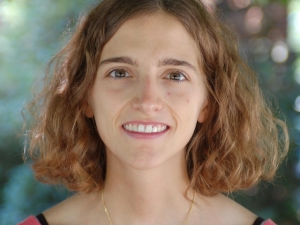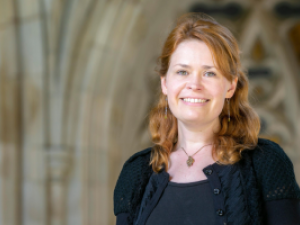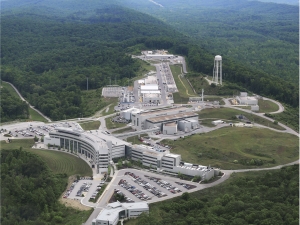In honor of Graduate Appreciation Week, members of the Department of Physics faculty prepared a Thank You video. Watch it below. More notes of thanks can be found here. Thank you for all you do! read more about Graduate Appreciation Week »
IonQ, the company founded by our faculty Profs. Jungsang Kim and Christopher Monroe, successfully launched its IPO and is now traded on the New York Stock Exchange. This is an important step for taking Quantum Computing from the lab to applications in the real world. Read more on the Pratt School of Engineering's website here. read more about IonQ Traded on Wall Street »
Graduate student Elise Le Boulicaut is the recipient of the prestigious James B. Duke International Research Travel Fellowship. Le Boulicaut plans to spend a year of study abroad at CERN, working on the next generation of silicon particle-tracking detectors for the ATLAS experiment and searching for physics beyond the Standard Model using multi-top-quark final states. Congratulations! read more about Grad Student Le Boulicaut Recipient of JB Duke International Travel Fellowship »
When Elizabeth Schrader signed up for a free short-course in the summer of 2019, the doctoral candidate in religion had no idea it would have an immediate impact on her scholarship. Two years earlier, Schrader published an article arguing that early Christian copyists may have altered the Gospel of John to minimize the role of Mary Magdalene. This was an important finding, but it wasn’t getting the attention in scholarly circles that she’d hoped for. “Although my work had appeared in a prestigious journal (the Harvard… read more about What I Got Out of the Duke Graduate Academy »
Graduate student and Sloan Scholar Aitor Bracho presented at the Second Annual Research Summit on Thursday, February 25, 2021. Bracho was one of twelve Sloan Scholars to present at the Summit which brought the Duke University Center of Exemplary Mentoring (UCEM) full circle with its first three-year grant. The scholars who presented had been preparing for the last six weeks with coaching from Assistant Dean Melissa Bostrom, and Sloan Grad Interns Dena Ho and Zane Swanson. During this program… read more about Grad Student Bracho Presented at UCEM's Second Annual Research Summit »
Prof. Haiyan Gao was elected to the office of Vice-Chair of the Division of Nuclear Physics of the American Physical Society for 2021. The progression of office is Vice-Chair, Chair-Elect, Chair, so she will become Chair of the DNP in 2023. We congratulate her on this great honor of being chosen to lead the Nuclear Physics Division and shape its future in the years to come. See the news in the APS February 2021 newsletter here. read more about Prof. Gao Elected Vice-Chair of the APS Division of Nuclear Physics »
The COHERENT particle physics experiment at the Department of Energy’s Oak Ridge National Laboratory has firmly established the existence of a new kind of neutrino interaction. Because neutrinos are electrically neutral and interact only weakly with matter, the quest to observe this interaction drove advances in detector technology and has added new information to theories aiming to explain mysteries of the cosmos. “The neutrino is thought to be at the heart of many open questions about the nature of the universe… read more about Compelling Evidence of Neutrino Process Opens Physics Possibilities »
Graduate student Tyler Johnson has been accepted as an Arms Control Fellow at the Stanford US-Russia Forum. The Stanford US-Russia Forum’s mission is to facilitate research and cooperation in areas of mutual interest to both the United States and Russia as well as link emerging scholars and leaders in the US-Russia space. This year’s fellows were chosen from a pool of more than 700 applications from 215 universities in Russia and the United States, a 5% acceptance rate. They hail from 11 countries,… read more about Graduate Student Johnson Accepted as Arms Control Fellow at SURF »
In a recent article, Popular Science summarized research that discovered the age of the universe, drawing on work by Daniel Scolnic, an assistant professor of Physics. read more about The Universe Is 13.8 Billion Years Old—Here’s How We Know »
How old is the universe? Current measurements show its 13.8 billion years, but given recent tension in cosmological results, the jury’s still out. Prof. Dan Scolnic weighs in. Click here to read "The universe is 13.8 billion years old—here’s how we know" in Popular Science. read more about Prof. Scolnic Talks With Popular Science About the Age of the Universe »
A Bass Connections project lead by TUNL Research & Development Engineer Matthew Busch and Prof. Joshua Socolar has been featured in DukeToday. Busch and Socolar combined their teaching and research interests with a common love of jazz and the sounds produced by great saxophone players. Undergraduate researchers Gia Jadick (Physics '20) and Max Bartlett (Computer Science '20) made great progress in documenting the design and acoustic characteristics of… read more about Department Members Recreate Vintage Saxophone Sound »
Duke Physics business manager Darlene McCain was quoted in a January 6th DukeToday article "Pursue Your Professional Development Online in 2021". Click here to read what McCain and others have to say about the resources provided by Learning and Organization Development. read more about Business Manager Darlene McCain Quoted in DukeToday »
If he could bottle the sound, he would. In his backyard music studio in Durham, Matthew Busch lifts his saxophone to his lips, takes a breath, and plays four languid notes. He ascends from an E to an A, then plays up an octave, holding each note for four beats. He switches to another mouthpiece, plays again. Repeats with a third. Busch describes the sound coaxed from each thumb-sized mouthpiece like he’s describing a favorite wine. One, a Selmer tenor sax mouthpiece from the 1950s, is expressive, balanced, bright. Another,… read more about Conjuring Coltrane »
In a year of compressed academic calendars and virtual conferences, the Duke Materials Initiative (DMI) pivoted from holding the first Triangle Hard Matter Workshop in person to hosting the event virtually. Over 300 faculty, postdoctoral associates and PhD students from not only Duke, North Carolina State and the University of North Carolina – Chapel Hill, but also from across the U.S. and overseas, including Germany and China, attended the event. Each of the sessions, focused on one of three tracks: Energy Materials,… read more about 2020 Triangle Hard Matter Workshop Was a Resounding Success »
We are very sad to share the news that John Kolena has passed away. Dr. Kolena was an instructor at the North Carolina School of Science and Mathematics and at Duke University. For many years, he taught astronomy and astrophysics classes in the Physics Department. After his retirement, he kept his connection to Duke, attending talks and interacting with the department community. He will be greatly missed. His obituary may be found here. Update: The North Carolina School of Science and Math will… read more about The Passing of John Kolena »
It is an exciting time at Duke University as the Quantum Center is growing. Originally envisioned by Prof. Jungsang Kim's quantum information lab, it has expanded to include Prof. Kenneth Brown since 2018 and over the next year we will welcome Marko Cetina, Crystal Noel, and Kim and Brown's long-time collaborator Christopher Monroe. Click here to read DukeStories' dynamic "More Possibilities… read more about An Update from the Duke Quantum Center »
When you run scientific studies that include infants, something will always go wrong. Families will be late or sick. The babies won’t behave. Or maybe, as happened at the Wilbourn Infant Laboratory at Duke (WILD), you’ll have to make a last-minute run to the store to buy a big pack of toothbrushes. In an interactive study, 20-month-old infants played with a variety of objects—things like a fake cookie and a toy apple, all of which the researchers had ensured were safe for infants. “We had it down,” said Makeba Wilbourn,… read more about Undergraduates Are Doing Real Research in Trinity College, And Everyone Benefits »
Alum Katrina Miller ('16) is currently a PhD student at the University of Chicago and was featured as part of the #BlackInAstro series on Astrobites during Black In Physics Week. Read Miller's interview here. From Miller's Duke Physics advisor Prof. Phil Barbeau: "I met Katrina in her Physics 152 class, and more than any of the other 300 students in that class, she was the one who most clearly thought about Physics the way I do. Katrina is right that it can be scary to… read more about Alum Miller Featured on #BlackInAstro »
In July 2021, Marko Cetina will join Duke University’s Department of Physics as an Assistant Professor. An atomic, molecular and optical physicist, Cetina has used his wide-ranging research in light, lasers and atoms to both explore the basic physics of quantum phenomena and support the development of improved technology necessary for today’s leading quantum machines. Cetina will come to Duke from the University of Maryland, where he worked at the Joint Quantum Institute alongside Chris Monroe, who joined the Duke faculty… read more about Marko Cetina: Building Quantum Machines to Understand Physical Processes »
When he received the email announcing that he had won the 2021 Herman Feshbach Prize, Berndt Mueller was in the hospital recovering from surgery. “Suddenly I get that email,” Mueller said. “It was totally unexpected.” Awarded each year by the American Physical Society, the $10,000 Feshbach Prize honors “outstanding research in theoretical nuclear physics.” Mueller was selected for his contributions to the scientific understanding of the quark-gluon plasma that filled the universe shortly after the Big Bang, which has proven… read more about Mueller Enters Next Phase With Feshbach Prize »
ACTIVE FACULTY ROBERT J. LEFKOWITZJames B. Duke Distinguished Professor of Medicine Robert Lefkowitz, M.D., has been a member of the Duke faculty since 1973 as a professor of medicine and a professor of biochemistry and chemistry. He won the 2012 Nobel Prize in Chemistry, sharing the award with Brian Kobilka, who did postdoctoral work with Lefkowitz at Duke. The two were recognized for their work on a class of cell surface receptors that have become the target of prescription drugs,… read more about A Look at Duke's Nobel Laureates »
The National Science Foundation has awarded Duke University a $3 million, five-year Research Traineeship grant to develop a program for graduate students to develop expertise in using artificial intelligence (AI) for materials science research. The aiM (AI for Understanding and Designing Materials), program will fill a vital workforce gap by training the next generation in the new convergent field of materials and computer science research.“To achieve the promise of the U.S. Materials Genome Initiative of… read more about Filling an AI and Materials Science Training Gap »
May 6, 2021 Update: Jonathon Yuly and his co-authors, including Peng Zhang and David Beratan, were awarded Proceedings of the National Academy of Sciences's 2020 Cozzarelli Prize for their paper on electron bifurcation. The award is given annually to six research teams whose articles have made "outstanding contributions to their fields." You can hear Yuly describe the paper in the video above or in an episode of PNAS's Science Sessions… read more about PhD Student Solves 40-Year Bioenergetics Mystery »
Prof. Dan Scolnic and Prof. Michael Troxel have weighed in on the latest measurements of the clumpiness of the universe for an article in The Atlantic. Click here to read "The Universe Might Be Too Thin: Scientists may have found a new crack in our understanding of the universe". read more about Profs. Scolnic and Troxel Weigh in on the Latest Measurements of the Clumpiness of the Universe »
Duke University researchers Jungsang Kim and Christophe Monroe will join peers from the national labs, universities, federal agencies and industry on a new National Quantum Initiative Advisory Committee (NQIAC) recently announced by the U.S. Department of Energy and the White House Office of Science and Technology Policy (OSTP). The NQIAC’s mission is to “counsel the Administration on ways to ensure continued American leadership in quantum information science” and was established by Executive Order as part of the… read more about Duke Joins Peers on New National Quantum Initiative Advisory Committee »
The Fall 2020 graduate student fellowships and awards have been named. Mary Creason Memorial Award: Ryan Bouabid The recipient earns a monetary reward. Read more about the Mary Creason Memorial Award here. AAPT Outstanding Teacher Assistants of the Year, 2019-20: Son Nguyen and Erik Peterson Recipients receive an AAPT gift membership which includes electronic access to premier journals: The American Journal of Physics, The… read more about Fall 2020 Graduate Student Fellowships and Awards »
Alfred Goshaw, James B. Duke Distinguished Professor Emeritus of Physics, surveys his career studying elementary particle physics for those "who are curious about how the field has evolved from the dawn of the Standard Model in the 1960s to activities today that require the use of mega particle detectors." Read the article at Innovation News Network. read more about Research in the Field of Elementary Particle Physics »
We are thrilled to welcome Prof. Chris Monroe to the faculty of the Physics Department. Prof. Monroe, a world-leading expert in Quantum-Information-Science, will join Duke University on January 1st 2021 with a joint appointment in Physics and ECE. Click here to read Pratt's new faculty profile "Chris Monroe: Realizing Ion-Trap Quantum Computers to Solve Unsolvable Problems." Photo credit: Pratt School of Engineering read more about New Faculty Profile: Chris Monroe »
An international leader in quantum computing, architect of the U.S. National Quantum Initiative, and member of the National Academy of Sciences, Chris Monroe will join longtime long-distance collaborators at Duke to build practical quantum computers for use in fields from finance to pharmaceuticals Chris Monroe, one of the world’s leading experts in trapping atoms and manipulating their quantum state for applications in quantum information science, has joined the faculty at Duke University. With a dual appointment in the… read more about Chris Monroe: Realizing Ion-Trap Quantum Computers to Solve Unsolvable Problems »




























